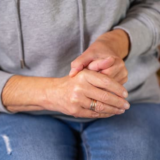Lupus = Lift up, persevere, use strength
November 18, 2021 by Lisa Bywaters

Written by Rachel Lea
During the 32 years of living the life of a Lupus Warrior, I’ve come to liken the feeling of battling lupus to the principles of the board game Snakes and Ladders. When the dice rolls, you take the number of steps forward that the dice dictates. Literally one step at a time. When you’re feeling well, and your lupus is under control, you may even land on a ladder and climb up the board a little bit further. When that’s happening, you feel truly happy, as you’re able to maintain a sense of balance and stability. It just feels good.
But then the game can change without warning, and the dice can roll towards a snake. When you hit a snake, it boldly raises its head and hisses at you. Taunting you. Because you know what’s coming. You’ve suffered another setback, another lupus flare. And so you begin to slide. You slide all the way down the back of that slippery snake, sometimes to the bottom of the board. That soaring happiness dissipates as you realise you have to begin the game all over again, and fight your way back up to the top of the board. This is how the game of lupus is played each day. Over and over and over again. At some point, you’ll always fall back down. Why? Because lupus always wins.
So the never-ending tweaking of medication takes place, whether it be increased steroids or methotrexate. This’ll require months and months of tapering back to the dose at which I was originally controlling my lupus. Before that flare took me down. My symptoms of extreme fatigue, joint and muscle pain, fevers, migraine-like headaches, mouth ulcers and hair loss are being treated by these medicines. It’s draining. And bloody frustrating! Particularly when I felt I was managing my lupus and overall health really well, and then, boom!
After thirty-two years of experiencing such flares, I’ve grown to realise that the only way to fight back is to simply let go. Let go of everything. Place myself in a protective bubble and focus on me. Hope that the drugs kick in quickly and move with the pain and discomfort the best way I can. I’ve grown to learn that it takes strength to surrender and put trust and faith in the universe. That even when I’m struggling like this, I’m exactly where I’m meant to be. I know this because when I’ve been too stoic, trying to rise above the pain and fatigue, the resulting flare has been longer and more challenging to overcome.
I grew to learn very early into my diagnosis the benefits of being very gentle and kind to myself. If that means having a teary and a good sook, so be it. If that means I’m in bed for days or even weeks, I’ve no choice but to give in. If it means I’m back on the higher doses of medications, with all of the nasty side effects that come with them, then that’s just the way it is. I just have to roll with it as best I can. I need to let go so I can get back on the game board again and keep rolling the dice.
I’m a kinder, more considerate and less judgmental person because of lupus. I’m more patient and adaptable when faced with new challenges. I’ve recognised that being able to persevere and be resilient in the face of uncertainty is a gift. Self-acceptance cultivates much inner peace, but when my acceptance of life with lupus is tested, I’ve learned to respect what this disease is and what it can do. If I wage a war against myself and push through without enough rest and respite, I’ll be causing more inflammation, more damage, and undo all the good I’m trying to nurture within my body. And that’s no good for me in the short or long-term. I’m managing a disease without a cure, one that’s unlikely to leave me anytime soon.
Not being well enough to continue my beloved vocation of working as a VCE secondary school teacher, I’m currently on another journey of personal growth and acceptance. In addition to having lupus, I’ve also been battling fibromyalgia for 8 years. As I became sicker, teaching became more challenging than usual, even when working part-time hours. I was also working within a combative, negative work environment. I was constantly asking myself, ‘how can I keep moving forward, finding hope and purpose as a chronically ill person in a toxic work environment like this?’ One where people strongly resisted the opportunity to invest more time and effort into creating greater goodwill and positive change that everyone could benefit from. How long could I endure the frustration of working like this and be in the best health possible? And ultimately, the question which intrigued me the most, ‘how do other people, like me, who have invisible chronic illnesses, cope in stressful, challenging workplaces? How do they find their way in the world when their pain is invisible to those around them? ’
With too many lupus flares to bounce back from and a working environment that wasn’t likely to improve, I resigned from my teaching job. It’s been a very isolating, extremely lonely and sad time for me. However, over time I’ve been able to reflect on the challenges of having lupus and working in a difficult work environment. This has resulted in my book ‘Lupus = Lift Up, Persevere, Use Strength’.
I’ve written my book in 3 parts. The first part, ‘Lift Up’, examines the 3 long years it took to diagnose my lupus. I was symptomatic at age 14 and diagnosed at 16. I describe the social, emotional and physical impacts of being ill as a teenager, its effects on my parents and family, and the stress of misdiagnosis and experimental treatment along the way. In part 2, ‘Persevere’, I discuss the struggles of having lupus while finishing school, university and the fear of entering the workplace as a secondary school teacher with a chronic illness. In the final part, ‘Use Strength’, I share the challenges of life in the workplace with an invisible illness and how I’ve tried to maintain hope and perspective.
It’s my greatest hope that my book can offer companionship and unity to fellow Lupus Warriors, chronic illness fighters, their carers and loved ones. I also hope to generate greater understanding and awareness of lupus, and cultivate more compassion and empathy for the challenges of living with a chronic illness. In all of the teachings that having lupus continues to bring, I know I must keep putting into practice what I’ve learned in being able to surrender and embrace the unknown with more courage, grace and acceptance.
Contact our free national Help Line
If you have questions about managing your pain, your musculoskeletal condition, treatment options, mental health issues, COVID-19, telehealth, or accessing services be sure to call our nurses. They’re available weekdays between 9am-5pm on 1800 263 265; email (helpline@msk.org.au) or via Messenger.














